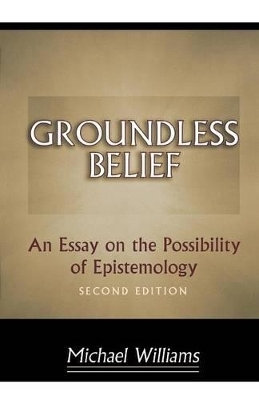
Groundless Belief
An Essay on the Possibility of Epistemology - Second Edition
Seiten
1999
|
Second Edition
Princeton University Press (Verlag)
978-0-691-00907-0 (ISBN)
Princeton University Press (Verlag)
978-0-691-00907-0 (ISBN)
Launches an all-out attack on what it calls "phenomenalism," the idea that our knowledge of the world rests on a perceptual or experiential foundation. This book states that the wider-than-normal usage of the term "phenomenalism" is to call attention to important continuities of thought between theories often thought to be competitors.
Inspired by the work of Wilfrid Sellars, Michael Williams launches an all-out attack on what he calls "phenomenalism," the idea that our knowledge of the world rests on a perceptual or experiential foundation. The point of this wider-than-normal usage of the term "phenomenalism," according to which even some forms of direct realism deserve to be called phenomenalistic, is to call attention to important continuities of thought between theories often thought to be competitors. Williams's target is not phenomenalism in its classical sense-datum and reductionist form but empiricism generally. Williams examines and rejects the idea that, unless our beliefs are answerable to a "given" element in experience, objective knowledge will be impossible. Groundless Belief was first published in 1977. This second edition contains a new afterword in which Williams places his arguments in the context of some current discussions of coherentism versus the Myth of the Given and explains their relation to subsequent developments in his own epistemological views.
Inspired by the work of Wilfrid Sellars, Michael Williams launches an all-out attack on what he calls "phenomenalism," the idea that our knowledge of the world rests on a perceptual or experiential foundation. The point of this wider-than-normal usage of the term "phenomenalism," according to which even some forms of direct realism deserve to be called phenomenalistic, is to call attention to important continuities of thought between theories often thought to be competitors. Williams's target is not phenomenalism in its classical sense-datum and reductionist form but empiricism generally. Williams examines and rejects the idea that, unless our beliefs are answerable to a "given" element in experience, objective knowledge will be impossible. Groundless Belief was first published in 1977. This second edition contains a new afterword in which Williams places his arguments in the context of some current discussions of coherentism versus the Myth of the Given and explains their relation to subsequent developments in his own epistemological views.
Michael Williams is Charles and Emma Morrison Professor of Humanities at Northwestern University.
Acknowledgments vii Preface to the Second Edition ix I Introduction: Epistemology and Scepticism 1 2 The Appeal to the Given 25 3 The Regress of Justification 60 4 Meaning or Theory? 116 5 Basic Propositions 145 Afterword 183 Index 203
| Erscheint lt. Verlag | 26.7.1999 |
|---|---|
| Verlagsort | New Jersey |
| Sprache | englisch |
| Maße | 140 x 216 mm |
| Gewicht | 255 g |
| Themenwelt | Geisteswissenschaften ► Philosophie ► Erkenntnistheorie / Wissenschaftstheorie |
| ISBN-10 | 0-691-00907-4 / 0691009074 |
| ISBN-13 | 978-0-691-00907-0 / 9780691009070 |
| Zustand | Neuware |
| Haben Sie eine Frage zum Produkt? |
Mehr entdecken
aus dem Bereich
aus dem Bereich
die Grundlegung der modernen Philosophie
Buch | Softcover (2023)
C.H.Beck (Verlag)
CHF 25,20
Buch | Softcover (2023)
Reclam, Philipp (Verlag)
CHF 9,80

![Was heißt Denken?. Vorlesung Wintersemester 1951/52. [Was bedeutet das alles?] - Martin Heidegger](/media/113619842)
